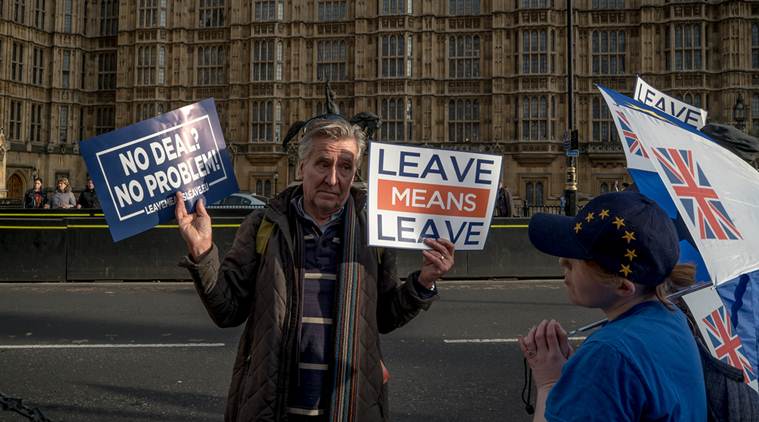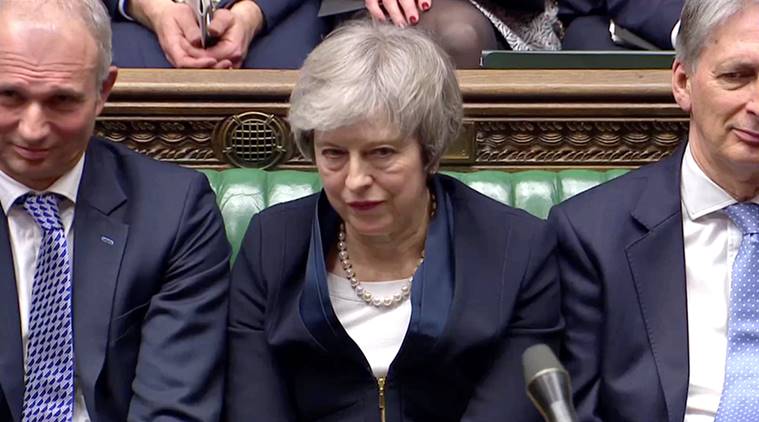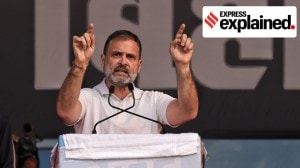- India
- International
Theresa May and Brexit face uncertain future after crushing defeat in Parliament
The 432-202 vote to reject her proposal was the biggest defeat in the House of Commons for a prime minister in recent British history. And it underscores how comprehensively May has failed to build consensus behind any single vision of how to exit the European Union.
 Demonstrators for and against Britain’s departure from the European Union gathered outside Parliament in London. (Andrew Testa/The New York Times/File)
Demonstrators for and against Britain’s departure from the European Union gathered outside Parliament in London. (Andrew Testa/The New York Times/File)
Written by: Stephen Castle and Ellen Barry
Prime Minister Theresa May on Tuesday suffered a humiliating defeat over her plan to withdraw Britain from the European Union, thrusting the country further into political chaos with only 10 weeks to go until it is scheduled to leave the bloc.
The 432-202 vote to reject her proposal was the biggest defeat in the House of Commons for a prime minister in recent British history. And it underscores how comprehensively May has failed to build consensus behind any single vision of how to exit the European Union.
Now factions in Parliament will offer their own proposals — setting off a new, unpredictable stage in Brexit, the process of withdrawing from the bloc.
“She has completely lost control of the process, and her version of Brexit must now be dead, if she loses by 230 votes,” said John Springford, deputy director of the Center for European Reform, a London-based research institute.

Negotiating the withdrawal from the European Union — which 52 percent of British voters, or 17.4 million people, supported in a referendum in 2016 — has been May’s single focus since she became prime minister, displacing social problems like housing and health care.
But her failure to convey any convincing vision of Britain’s future outside the European Union has allowed painful divisions in the country to deepen.
And it has created a risk that Britain will exit the 28-nation European bloc with no deal, which analysts have warned could tip Britain into recession and trigger shortages of food, medicine and electricity because of constraints on trade.
 Prime Minister Theresa May sits down in Parliament after the vote on May’s Brexit deal, in London, Britain, in this screengrab taken from video. (Reuters)
Prime Minister Theresa May sits down in Parliament after the vote on May’s Brexit deal, in London, Britain, in this screengrab taken from video. (Reuters)
May’s plan would ultimately have given Britain’s government power over immigration from Europe, and would have kept Britain in the European Union’s customs and trade system until at least the end of 2020 while a long-term pact is negotiated.
Immediately after the vote against her proposal, the Labour Party leader, Jeremy Corbyn, citing the “sheer incompetence of this government,” called for a vote of no confidence in May, which will be debated Wednesday.
That could in theory lead to a general election, but few analysts said they thought he could muster the necessary votes.
European Union officials, who have waited for Britain to resolve its plan, were muted in an official statement, though exasperated on Twitter.
“If a deal is impossible, and no one wants no deal, then who will finally have the courage to say what the only positive solution is?” Donald Tusk, the president of the European Council, wrote in a Twitter post.
Jean-Claude Juncker, the president of the European Commission, said on Twitter: “I urge the UK to clarify its intentions as soon as possible. Time is almost up.”
Before the vote, May and her supporters were urging lawmakers in both the Conservative and Labour Parties to resolve the stalemate and back her plan, saying that a vote in favor would put country before party.
In her final appeal in Parliament, May, a Conservative, impressed on lawmakers the importance of the vote facing them.
“The responsibility on each and every one of us at this moment is profound,” she said, “for this is a historic decision that will set the future of our country for generations.”
Like most others, though, the prime minister had no easy answers about the way forward. She has signaled that she will appeal to the European Union in Brussels for more concessions and try again to win parliamentary approval, but the bloc is unlikely to grant her any concessions unless she has a convincing new plan.
After the vote, May said she would allow members of Parliament to debate the various Brexit plans being bandied about.
Springford of the Center for European Reform said that if Parliament coalesced around a clear proposal for the future, May could try to negotiate such a result with the European Union.
But to win Labour Party support, any new proposal would likely be a “softer” Brexit that would keep closer economic ties to the European Union.
Corbyn would then be on the spot, forced to decide whether to work with May on Brexit or bow to pressure from within his party for a second referendum.
“I think it’s now between a softer Brexit and a second referendum,” Springford said.
Still, with no consensus behind any one path, and a vanishing window for further negotiation, more radical solutions are rising to the fore.
One group of lawmakers is campaigning for a repeat referendum, which could potentially reverse the decision to leave the European Union. Another favors leaving the bloc as planned March 29 without a withdrawal agreement, a so-called “hard” Brexit.
May had expected to lose Tuesday’s critical vote, having lost the support of many of her own lawmakers. But her surrogates scrambled up to the moment of the vote to rally lawmakers to her side in hopes of keeping the margin of loss narrow enough. That would have allowed her to try again for parliamentary approval.
Before the vote, the attorney general, Geoffrey Cox, raked his eyes over the backbenches of the Commons and rebuked Parliament, in a booming voice, for contemplating a sudden and unregulated end to 45 years of integration with Europe.
Exhorting his fellow Conservatives to get behind May’s plan, Cox asked: “What are you playing at? What are you doing? You are not children in the playground. You are legislators, and it is your job. We are playing with people’s lives.”
He continued, rolling his R’s in theatrical fashion, “Do we opt for order? Or do we choose chaos?”
The environment secretary, Michael Gove, was equally dramatic in a morning radio interview, warning lawmakers that “if we don’t vote for this deal tonight, in the words of Jon Snow, winter is coming,” a reference to “Game of Thrones.”
But critics of the deal were equally adamant, saying May had emerged from two years of negotiations with an agreement that satisfied no one.
Dominic Raab, who stepped down as May’s Brexit secretary in November, described her agreement as “wracked with self-doubt, defeatism and fear.”
“This deal before us can’t end the grinding process — it can only prolong it,” Raab said. “It would torment us and our European neighbors for the foreseeable future.”
Under normal circumstances, a British prime minister would be expected to resign after losing a vote on a flagship policy. But the Brexit process has so unsettled political conventions that May could survive to make revisions and pitch her deal again.
In December, May survived a leadership challenge from within her own Conservative Party and, under its rules, is safe from another until the end of the year.
“We have been in extraordinary circumstances,” said Nikki da Costa, a former director of legal affairs at 10 Downing St. “Things that in normal times would not be considered survivable have become normalized. What the government would be looking for is a pathway through this.”
Da Costa predicted: “We will be doing this again in a couple of weeks’ time.”
Philip Cowley, a professor of politics at Queen Mary University of London, said he was struggling to identify a comparable defeat in the history of British politics.
“When you ask me for a historical bench mark, I can’t find any example,” Cowley said.
Apr 25: Latest News
- 01
- 02
- 03
- 04
- 05







































